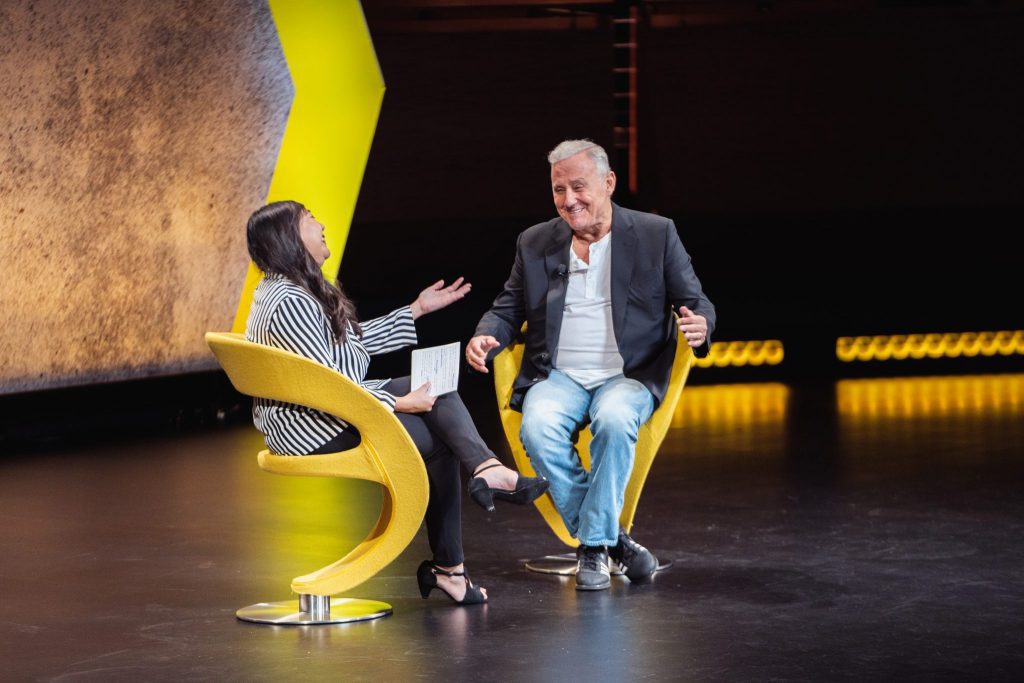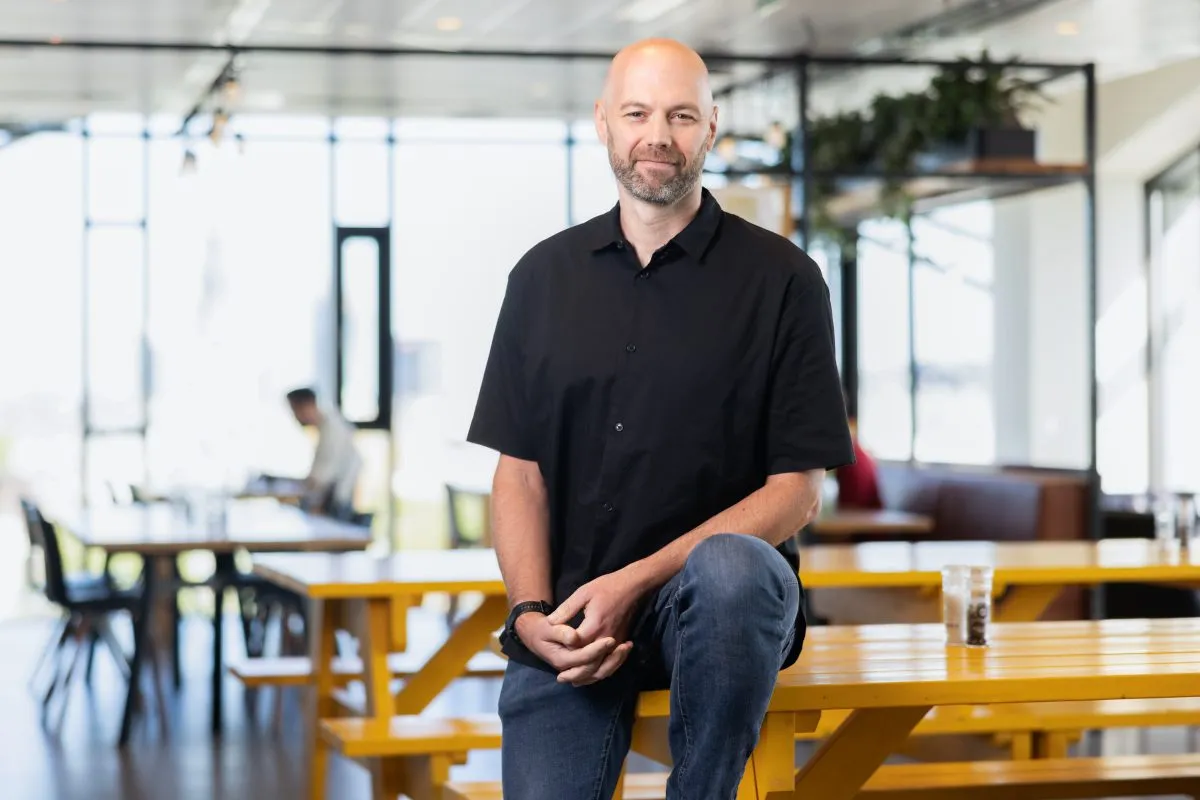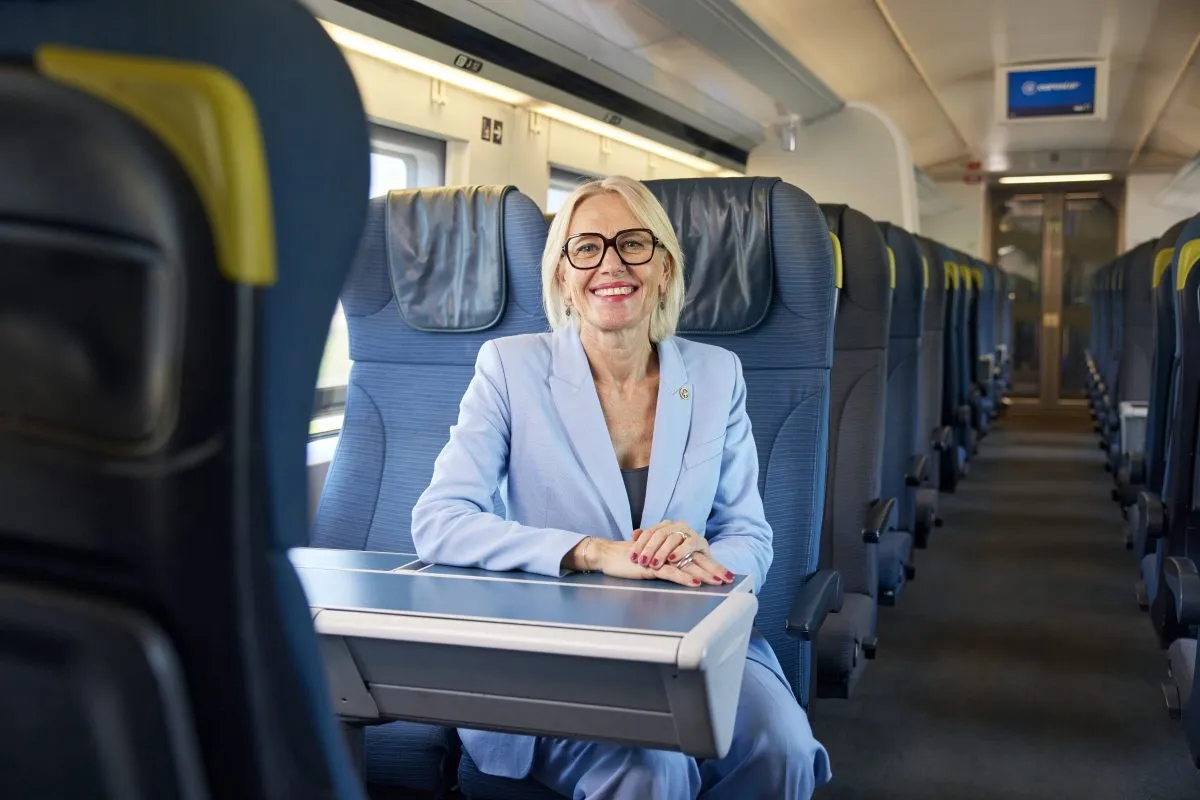Ian Schrager on How Hotels Get Technology Wrong

Skift Take
Technology remains the new frontier but plenty of hotels are still getting it wrong, according to the man who pioneered the boutique hotel movement in the United States.
Ian Schrager, who founded the Morgans Hotel Group and has launched a number of other brands, said hotels are too focussed on showing gadgets rather than using technology to make things easier for guests.
"I think technology is the future but not mood boards in the lobby, and not iPads in every room but technology that really makes everyone's stay at a hotel easier, cheaper and there is a reason for it," Schrager at Skift Global Forum on Thursday in New York City.
"Up to now I don't think we've been using technology well."
Schrager said that hotel companies need to remember that they are in the hospitality business and that the guest experience needs to be "doing something that astonishes people," with added "excitement" and "glamor."
One of the best uses of technology, Schrager said, is to make the guest experience as easy as possible.
Process like check-in and check-out should be "absolutely frictionless and the time cut down to nothing."
Paying bills and communicating with guests before, after and during could be made much simpler
"We can't sit still and let everybody else do it and we follow everybody," Schrager said.
The hotel industry should not forget the importance of innovation and care. "We forget that we're really hosts, taking care of people who come into your home," he said.
"I think sometimes that gets lost in the RevPAR [Revenue per available room a favorite hotel industry metric] and all the other objective criteria and second to that I think it's such a capital intensive industry it's hard to innovate. I think we make a mistake if we don't innovate."
The Trump Slump?
Schrager also spoke candidly about President Donald Trump's impact on travel tourism and hospitality. Schrager knows Trump from his days running Manhattan nightclub Studio 54.
Schrager said the policies coming from the White House were "very bad for business" and "very un-American."
"I think it's difficult for an entrepreneur—who does things impulsively, instinctively he's not afraid of making a mistake—of running a big country, like it would be running a big company," he said.
Schrager said that even if some of the president's tax breaks and business policies had benefited him personally, that he didn't think it was "good for the country."
Read the Full Edited Transcript of the Interview
Skift: All right, so our next speaker, Ian, needs very little to no introduction but this is going to be my very meager attempt to summarize his more than 50-year career in the hospitality and entertainment industries.
So, back in 1977, Ian, who was then a lawyer, and his business partner, Steve Rubell, co-founded the iconic Studio 54 night club in New York City. And seven years later, in 1984, they opened the Morgans Hotel, which was so influential in really bringing about the boutique hotel movement here in the United States—an era that really sparked hotels that were driven by design, fashion, culture, nightlife, food and beverage, and so much more.
Since Morgans Hotel, Ian has worked with Marriott to launch the Edition brand of luxury hotels all around the world. He's opening many more this year. And e also launched his own brand of hotels, called Public, recently.
Before I begin to ask Ian a bunch of questions, I want to remind the audience to please feel free to submit any questions that you may have for Ian using our event app. Feel free to up vote the ones that you like, and thank you so much for being here, Ian, we really appreciate it.
Ian Schrager: It's a pleasure.
Skift: So, one thing I've noticed in the conversations that we've had together, is that you're constantly looking for ways to innovate and to disrupt. You're the type of person who has never been content to rest on your laurels.
I wanted to ask you, why do you think that is and how are you attempting to reinvent hospitality all over again?
Schrager: Oh, well, our focus has always been on creating an experience, lifting the spirit of the people who come to the hotel. You know, we're not relying on the efficiencies of execution or the location or the current state of the market, actually you can do a hotel in any market, in any cycle, as so long as it's a distinctive product, whether it's in New York or Paris or Kansas City, because I think we should become a product-driven industry rather than [relying on] the efficiencies of execution.
What interests me is always going in there and doing something that astonishes people, that they feel they're in some kind of new kind of environment with that excitement and glamour in the air, and that's what interests me.
The payoff for me is when I see that, and to do the good product and focus on doing the good product, the money comes as a natural consequence of that.
Skift: So it's fair to say you're a bit of a perfectionist, I guess.
Schrager: Yeah.
Skift: Another thing that I've also found really interesting is that you are not at all afraid of more technology or more automation in hospitality. In fact, you actually pretty openly embrace it, especially with the Public hotels brand. I wanted to ask you, why is that and how do you see technology disrupting hospitality going forward, but for the better?
Schrager: You know, I'm not from that generation of technology. My seven- year-old son is my tech department in the house.
Skift: Your IT department.
Schrager: But, I think — I don't have data or anything like that just instinctively — I think when we got started, we had to rely on things that other people weren't doing: design, food and beverage, and everything else.
Now, it's out there. It doesn't take people a long time to see when something is a good idea and it makes money. So, now everybody is doing it and some are doing it well and some are not doing it so well.
Skift: Can you name who's not doing it well?
Schrager: What?
Skift: Can you name who's not doing it well?
Schrager: Marriott is doing well. And some are doing it in a banal kind of way, but I think that that universe of design has less upside to really blow people away.
So, I think technology is the future, but not mood boards in the lobby and not iPads in every room, but technology that really makes every transaction at a hotel easier or cheaper, and there is a reason for it.
Up to now, I don't feel that we've been using the technology well. I think this issue of saying it takes away from personal contact is ridiculous.
We don't mind buying our tickets in a movie theater. We don't mind getting our gas and paying for it. We love all those things they offer in the airlines. It's just a question of whether or not it's done well. It's fun to do it if it will razzle dazzle the customer.
So, I think that's the future. It's very difficult in this country because the various companies don't talk to each other with a place where all of it was invented and you can't implement it because of capitalism, nobody cooperates.
So, we had to go to Europe and really jerry-rig the technology and it's too bad because the public really benefits from having the great technology. Not contrived, not necessarily Alexa or [Amazon] Echo in the room, but every transaction, everything that happens to the wizardry of technology. It's the future, as far as I'm standing.
Skift: … Just to make things a lot easier. Do you feel like the technology that you have at Public, for instance, is it really advanced enough to really provide exceptional hospitality or do you ever worry that service standards might suffer in any way?
Schrager: Nope. You're gonna have to kind of figure it out. I think it has to work, it has to work well. I don't think the personal service in the ... do we mind getting on an Apple phone and looking up a number by not speaking to a personal operator and just kind of punching in? No, we don't mind it.
You know, everyone in China pays by Apple Pay or whatever to their iPhone. We don't do that so much here because we have to unlearn what we've done and then China, they just didn't have that obstacle.
No, it depends upon how it's executed. I think we don't really have ... a lot of the people in the industry don't really have a good idea — as well as me — on how that's supposed to work. So, we just [put] ... computers in the room, iPads in the room even though everybody travels with their own technology. All this kind of stuff that, to me, it doesn't do anything.
Skift: Are there certain particular technologies that have caught your eye and that you do think have sort of feasibility in the hospitality experience?
Schrager: I think the check-in process and the check-out process could be absolutely frictionless and the time cut down to nothing. I think getting your bills, I think communicating with the customer before they get there, communicating with the customer while they're there, as long as you don't inundate them. I think communicating with the customer after they leave, those are all great things.
I think being able to order your food, your wine, and everything, and doing it in a great way and then be able to walk downstairs and the food's on the table.
I think not being able ... being able to pay for everything which is an issue because of the different platforms. I think everything that you can do over the technology provided you can get it done quickly; it is just a great thing.
I think the things like the mood boards in the lobby and the stuff like that is a kind of waste of time. Nobody uses them, the kids play with them.
Like for instance, people say that the young kids don't need to go to bars because everybody is dating over the technology.
Skift: Those apps like Tinder.
Schrager: Right. So, I'm not so sure that's true by the way. I think there's no replacement for going to a bar and things like that, but I wouldn't mind doing that swipe left, swipe right for people in the hotel.
[Laughter]
Skift: That could be our next startup idea.
Schrager: You have to figure it out, but we can't sit still and let everybody else do it and we follow everybody. We have to figure it out and I think that technology is the new frontier and I ... we were just talking backstage, I think it's so great that the Marriott is trying to self check-in in Hawaii because it is the future, and so, I just think it's all about technology.
Skift: And speaking of the future, I wanted to ask you: What do you sort of see is the next big disruption in lodging? You already played a very pivotal role in one big disruption which was the boutique hotel. But what's the next boutique hotel? Is it Airbnb? Is it something else?
Schrager: No, I think the way we market and advertise is a big disruption coming down the pike. Usually, I don't know, I think the marketing expense in a hotel can be anywhere between 3 percent to 8 percent, I suppose.
A lot of that is with the sales effort, but I think the advertising and the direct mail is not effective, and I think using social media is an incredibly valuable tool. It doesn't cost anything. I think that's an area that we all have to get better at and we find using it more and more and more at a very effective price point. I think that's the next big thing and
I also think ... I don't have any data to support this, but I also think that the societies, the middle class is shrinking and you're having the wealthy people, more than the 1 percent are the wealthy people and you're having the people that don't have as much wealth with less of a middle class.
I think hotels need to follow that, and I think there may be hotels that are super, super luxury. Not, they used to be 800 rooms and now the sweet spot was 300 rooms, that may come down to 70 or 80 rooms really, really, really expensive luxury hotel, and hotels that bring a whole bunch of new energy and sophistication and style and food and beverage into the less expensive market, and it'd be those two groups, and not as much in the middle, which is the way we're going as the way humanity is going.
That's why I am very interested in the less expensive market, which is always the biggest money-making market anyways.
Skift: Right. That bifurcation is what prompted you to launch Public.
So, speaking of society, I mean, you've been such a part of our ... the fabric of our social lexicon for so long, and just next week you have a documentary coming out about Studio 54 and we have a brief little clip to show everyone here in the audience to give you a little bit of a sneak peek.
Ian Schrager: Oh, now?
Skift: Yes, I hope so.
[Clip previewing the Studio 54 documentary plays]
Schrager: I had nothing to do with that.
Skift: Oh, you definitely did. Something I've always wanted to ask you is, do you think something like a Studio 54 could exist today?
Schrager: Yes, I do.
We did a documentary with Matt Tyrnauer on that and he was the filmmaker. He wasn't there. He doesn't think it could be done today because of the cell phones, the dating apps, the AIDS [crisis]. There's a whole bunch of different cultural differences, but I don't agree.
I think that human urge has been going on for 5,000 years. So serious about this, it takes on different iterations. Cars change, kitchen appliances change, fashion changes, but still the basic premise is still the same. So, you have to find out the new fashion forward and how it kind of works.
There are two places in the world where it is happening still. It's the new nightclubs that are in East Berlin; they don't let you take the iPhone in there. So, everybody can have this feeling of privacy and freedom and Ibiza, with that kind of mayhem, over the dance floor.
So I do think it [can be done] ... but it takes a younger person to come up with another idea. It's a young person's business, but I definitely think it can ... and we do it in the Editions because it helps the hotel and we have smaller versions of it, and we see glimpses of that energy, that legal naughty behavior. So yes, we don't change. We have a human condition.
Skift: One of your former Studio 54 patrons now happens to be the President of the United States. I know you and Donald Trump go way back and you consider him a friend, but I wanted to ask you, what are your thoughts on his administration's policies, especially his policies that relate to travel? Like the travel ban, for instance?
Schrager: From the Presidential office? From the President?
Skift: Yes.
Schrager: I think it's very, very bad for the business. It's very un-American. You know, I don't want to get myself in trouble here. I don't think it's good for business. I don't think we should be fighting with Canada, I don't think we should be doing all these things, but I don't know, and I know Donald for a long time from New York; he's a hardworking guy, he's very smart.
I think it's difficult for an entrepreneur who does things impulsively, instinctively, he's not afraid of making a mistake, to run a big country like it would be to run a big company.
So I think people like Arne Sorenson, Bob Iger, the guy who runs Starbucks, Bloomberg, those guys, they run big companies, they can run the country. I don't think the skillset of an entrepreneur is the right skillset for running the country, and I think a lot of the things that are happening are not good. Even if some of the things like the tax breaks in the real estate, things benefit me personally, I don't think it's good for the country and I think it's having an effect on business, especially international travel.
Skift: I know when you were talking backstage, you described our country as being divided. When you think of today's society and culture, and all the upheaval and the transition that we're going through right now, what with the political divisions, the Me Too movement, just so many fundamental cultural changes taking place, I wanted to ask you, what's the solution here? Can you see a solution here?
Ian Schrager: It's scary, very concerning to me.
It's so funny, I have a seven-year-old son and I watch all the cartoons, again. There's a cartoon Wally, if anybody's seen it out there. You have your own kids and then there the entity that runs everything is this huge, huge business; Big Boy Markets it's called.
It's a funny kind of visionary because I look at Google and Amazon and Apple and all those ... I don't know. That splintering of everything is just ... it's very concerning to me, whether or not there's a little more of like broke, like with Congress.
There have been times when there have been difficulties in Congress and they didn't get along. There were even fights. I mean, it took 38 votes to get Thomas Jefferson elected, but it's nothing like this, what's going on now and it's a real concern for me.
I don't know how to respond to it. I don't know where it's going to end. Sometimes I think it can't end well, though it's a difficult time. I'm more unsettled about what's going on now than I was doing during the '60s when there was upheaval and violence everywhere. I could understand the upheaval and the violence.
I can't understand everything that's going on now, and it's a concern for me, and I worry that maybe Fabio might run for President the next time.
Skift: I was thinking about this. In previous interviews that I've listened to you do, you've often described yourself as, well, you don't see yourself per se as a hotelier but you see yourself as more of someone who works in the entertainment business. I was wondering, do you see a role for yourself and your place in hospitality as providing some sort of respite from what's going on or some sort of escape?
Schrager: Well, it's so funny. The best benefit I got out of Studio [54] was that I didn't have any discernible product and I had the same liquor, the same music that everybody else had. So, therefore, it was the kind of magic we could create that made it successful.
Steve Jobs did that with the iPhone, Walt Disney did that with the animation. So, I consider myself more in the entertainment business than I do with a hotelier, although that's what I love to do and I love doing hotels and it's been very expansive for me working with Marriott, it's been a real learning curve.
I like to think ... I would hope to think that the more sensitive design aspirations of everybody benefit the people, benefit the public. I kinda made a difference with that, and I loved doing ... I still love doing hotels. If I didn't, I wouldn't do them anymore, but I still have something to say.
I don't like to do nightclubs anymore because I don't have anything to say. I don't have anything new to offer but I still love the hotel world.
Skift: That's great, and I think we have time for just one audience question. So we're going to do the most popular one, which is: What is the number one thing that hotels get wrong?
Schrager: Well, I think that it doesn't morph into a business and we forget that we're really hosts, taking care of people that they come into your home and entertaining them like the way they would if they were guests in your home.
I think, sometimes, that gets lost in all the RevPAR and all the other objective criteria we use.
Second to that, I think because it's such a capital-intensive industry, it's hard to innovate and I think we make a mistake. We don't innovate because the ... your business can need to be based upon a great price, or to be based upon great service. We've done that but we're not doing enough in the area of innovation.
I think that that's why we go through these cycles. I'm not talking the economic cycles. I mean, the 30-year cycle version, now we're on design and we kill it and what's the next thing? So, no, I would ... and that's why I think a lot of the small independents are doing that, and it's a good thing, and I think it's a good thing a lot of the companies are getting involved with the small independents.
I think the lack of innovation and the lack of charm ... people come into your hotel when they feel they're in a special place. It's what we need to do better and better.
Skift: Thank you so much and we're out of time unfortunately, but thank you so much for being here.
Schrager: Thank you so much.




